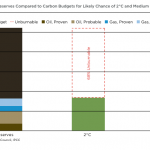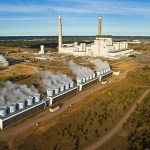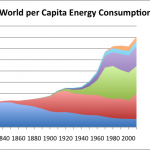coal
There is no free lunch, but you can watch a normally unfree documentary for free on the usual streaming networks for a little while.
Click here to get to the NGS site
From Hollywood Reporter:
Michael Bloomberg, founder of Bloomberg Philanthropies, says, “Coal affects our lives and planet in important ways, but people often take positions on it without seeing the full picture. So this week, National Geographic is making From the Ashes available for free on a number of platforms. We encourage family and friends to watch the film and join the CrowdRise campaign to support organizations that are…
If most of the electricity used to charge your electric car is made by burning coal, is it still worth it, in terms of CO2 release, to buy an electric car?
Yes. And you will also save money on fuel.
Don't believe me? Want me to show you? What, are you from Missouri or something? Fine. I'll show you.
A few years ago, when there were no affordable electric cars that were real cars, we decided to look into buying the next best thing, a hybrid. We wanted to get the Toyota Prius because it looked like a good car, had long proven technology, and all the people we knew who had one were happy…
At the Center for Public Integrity, Jim Morris reports on working conditions at the nation’s oil refineries, writing that more than 500 refinery incidents have been reported to the U.S. Environmental Protection Agency since 1994, calling into question the adequacy of EPA and federal labor rules designed to protect workers as well as the public. Morris begins the story with John Moore, who in 2010 was working at a Tesoro Corporation oil refinery north of Seattle — he writes:
Up the hill from Moore, in the Naphtha Hydrotreater unit, seven workers were restoring to service a bank of heat…
Obviously, we need to stop the human enhanced extra greenhouse effect. There are a number of ways to approach this. Let me say right away that taking CO2, the main greenhouse gas of concern long term, out of the atmosphere is NOT one of the ways. Here's why: It takes energy to put Carbon into solid or liquid form. You get energy back when you move the Carbon into a gas form (as CO2). That is something of an oversimplification but long term, large scale, it is correct. Since, for the most part, the greenhouse effect is caused by the the generation of energy for use, which causes the movement…
Governor Mark Dayton has called for the elimination of coal as a source of energy in Minnesota. Doing so is, clearly, essential. Having a governor call for it is a new thing; we are only seeing this sort of policy being developed recently.
From MPR News, Dayton said to a group of energy policy ad business leaders:
"Tell us what a timeline would look like, what has to happen for that timeline to be met and what kind of incentives or inducements do we need to provide to make that happen," ...
Dayton's comments came during the state's first-ever Clean Energy Economy Summit. He said…
This just in:
New Oil Change International interactive graphic shows growing fossil fuel reserves in contrast to shrinking global carbon budget
WASHINGTON, DC – New analysis by Oil Change International shows that global fossil fuel reserves continue to expand while the Intergovernmental Panel on Climate Change and other scientific and industry analysts repeatedly show that our remaining budget for burning fossil fuels has shrunk to less than one third of existing reserves.
The Oil Change analysis shows that fossil fuel companies gained access to more than twice as much in fossil fuels as they…
Coal-fired electricity production is bad on so many levels.
You'd think humans could learn from history, but sadly, no, and no. The childhood asthma statistics alone should be enough. Coal burning power plants are a leading producer of asthma causing pollution. And then there's the mercury...and the mountain-top removal, and the waste products..and, well, when do we say "enough"?
Interesting picture, stolen from Early Warning.
In case it isn't obvious its the price of coal (mostly stable) and gas (much more spiky, but currently below coal) per Mbtu.
Refs
* The Future of Natural Gas - Rutt Bridges at Climate, Etc.
The always-thoughtful Gail Tverberg has a great post that simply shows in visual terms the history of world energy consumption - well worth a look. I've reproduced one of her graphs here, but please read the whole thing.
One graph not in her post (not suggesting it should be, but I like the contrast) is world discovery of oil over about the same period - anyone who implicitly believes we are discovering vast reserves should contrast the two:
(Source, Colin Campbell)
Gail goes on to write about how an economist might be misled by past trends to disregard "facts in the ground" - lack of…
In the comments to Romm Echoes Groundless Cell Phone/Cancer Fears? we've degenerated into an argument about the safety of nuclear versus solar power ("which do you think has killed more people: radiation from Fukushima, or solar-voltaic installers falling from ladders?" was my question. It is a trick question, of course, because no-one has died from Fukushima as far as I know. But the correct question, of course, is deaths per unit of 'lectric generated). MV, beng something of a spoilsport (just joking, don't worry) pops the bubble by pointing to someone who has actually worked some numbers…
On April 5, 2010, an explosion occurred at Massey Energy's Upper Big Branch Mine in Raleigh County, West Virginia. The blast rocketed through 2.5 miles of underground chambers and tunnels nearly 1,000 feet beneath the mountains, and it killed 29 miners and severely injured another. The youngest victim was Cory Thomas Davis, age 20, who loved spending weekends hunting and fishing in the mountains, and the oldest was Benny Willingham, age 61, a Vietnam veteran of the US Air Force who had been a coal miner for 30 years and was five weeks away from retirement.
Shortly after the tragic day, then-…
April is the month that utility shut-offs are resumed in much of the northern half of the country - it is against the law to shut off people's primary heating fuel during the winter, but when they can't pay their bills, generally speaking, April 1 means that you can cut them off. There has been some upheaval in our area, where an unusually cold spring has meant that there is still a need for supplemental heating, and many poor people with very cold houses.
I thought it was worth re-running this article - a version of this ran in 2005, and I've republished it several times since then. We…
By Dick Clapp
An ambitious paper was released in Boston last week, with subsequent media coverage in local, national and international outlets (see, for example the New York Times' Green Blog and Reuters). The first author, Paul Epstein, was interviewed on the Greenpeace ship the Arctic Sunrise, which was anchored in the Boston Harbor as part of its month-long "Coal Free Future Tour." The paper, which was just published in the Annals of the New York Academy of Sciences, was the result of a two-year collaborative effort that I participated in, as did Celeste Monforton, other academics from…
Mary Kay Magistad of PRI's The World surveys the cost of China's huge appetite for coal and reports that it's harmful to workers as well as air quality. She interviews 37-year-old coal miner Zhong Guangwei, who developed a severe case of pneumoconiosis, or black lung disease, after just 10 months of working in a coal mine in the Shanxi province.
"Down in the mine, the coal dust was so thick, we couldn't even see people who were four or five feet away," Zhong says. "We had to just shout out to each other, to see who was around. There were no safety precautions, and the ventilation was terrible…
I think the first time I really seriously reconsidered the American ubiquity of the dryer was when I was in college, and a friend of mine made a list of ten things she considered hysterically funny about Americans. Number 3, after paying more money for milk with the fat pulled out and something about our worldview, was that we consider it perfectly normal to buy an enormous box at great expense to do precisely what the air will do for you anyway. Put that way, and with her performance of "American justifying why they need a dryer," it was pretty humorous.
It isn't like I even had one much…
On Saturday night, about 9 p.m., a short, sharp explosion rattled one of Russia's largest coal mines, a deep maze of underground tunnels located in Siberia. About 370 miners were working at the time.
Most of them came hurrying out of mine entrances. But not all. Managers organized rescue teams and sent about 50 people back into the Raspadskaya mine to hunt for survivors - and bodies. In the best of circumstances - which would not be in the panic of an emergency, in the middle of the night - this would be a daunting task. The mine's tunnels (an estimated 200 miles worth) plunge…
Renewable energy advocates like to trumpet the rapid growth rate of wind farms and solar power plants, and it's true. Installed wind capacity grew by almost 32 percent globally in 2009, according to on industry estimate. Capacity is now doubling every three years. That's a remarkable feat, considering how sluggish the world economy has been. But it's important to put such numbers in perspective.
All the wind farms in the world are capable of producing just 160 GW of electricity (let's not worry about actual production vs theoretical capacity for the moment). By comparison, the total global…
This seems to have become unofficial volcano week, here at ScienceBlogs. If you haven't been following the coverage of the Eyjafjallajökull eruption at Erik Klemetti's Eruptions blog, you should consider doing so. Also, Dr. Isis has a post on how the eruption has fouled up all nuclear imaging plans at her place of research, and Ethan explains how volcanic lightening works.
Our benevolent overlords have further commented: "Eyjafjallajökull's ill temper has been an unexpected object lesson in the complexity and interconnectedness of our environment, technology, and social networks." To that I…
The arguments against carbon capture and sequestration are legion and the list of reasons not to invest more resources in the technology just keeps getting longer. Here's a new analysis from Canadian journalist Graham Thomson. Some of his figures-- on global carbon emissions, for example -- are less than accurate, and this isn't peer-reviewed science, just a journalist's compendium commissioned by the Munk Centre for International Studies University of Toronto. But even allowing for that, Thompson manages to hit the proverbial nail on the head:
The very promise of CCS, whether delivered or…







